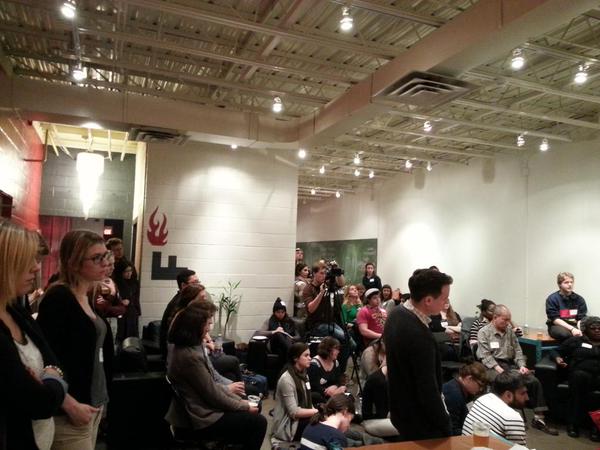Who’s afraid of an unpaid internship?
by Maggie Reid
Less than two weeks after Bank of Canada Governor Stephen Poloz advised youth to take unpaid positions to boost their resumes, a group of aspiring and emerging media workers, activists and academics gathered to tackle the weight of these words.
On November 12, the Communications Workers of America-Canada’s Associate Member program held a media mixer at the Foundery in Toronto. Attendees gathered to network, eat, drink and discuss the media labour market and strategies for navigating internships and precarious work.
A panel moderated by journalist Denise Balkissoon, featuring writer and social critic Septembre Anderson and University of Toronto professor Nicole Cohen, provided a critical assessment of the rise of precarious and unpaid labour in media industries while leaving us with a sense of hope that alternatives can and are being created.
Anderson shared her experiences steering through the often-exploitative terrain of the internship world, pointing out that internships are increasingly replacing entry-level positions. Unpaid internships have essentially become a rite of passage in the media industries while there has been a simultaneous devaluing of such work, she said. Anderson said that her first unpaid internships were not meaningful learning experiences and that landing paid positions was difficult without paid experience—challenging the idea that internships are always an entry into paid work.
Cohen pointed out that with the digital turn, the uncertainty and risk plaguing journalism and the cultural industries is being shifted onto individuals. While journalism was once a heavily unionized industry, the decline of unionized positions has contributed to increases in precarious work. Being in positions of unpaid or precarious labour creates conditions where workers can feel powerless and vulnerable. Precarious work often means that people without employee status fear the repercussions of complaining about unfair treatment in the workplace.
There have been a few measures taken recently in attempts to curb the growing problem of unpaid labour. The Ontario Ministry of Labour cracked down on two magazines earlier this year (Toronto Life and The Walrus) for their unpaid internship programs, though Cohen and Anderson were clear that this should not be viewed as a watershed moment. This move by the Ministry of Labour was part of a greater blitz in the GTA to evaluate whether employers across various sectors including advertising, public relations, consulting, computer systems design and information services were complying with the Employment Standards Act. The blitz, which included 56 workplace inspections, led to the issuing of 36 compliance orders and one order to pay wages, resulting in $48,543 paid back to employees.
According to Ontario’s Employment Standards Act, for an unpaid internship to be deemed legal it must be part of a vocational or post-secondary program. Further, the internship must be “for the benefit of the individual”—those providing training must “derive little, if any, benefit from the activity of the individual,” and the intern must not “displace employees of the person providing the training.”
Despite the legal status of unpaid internships, unpaid positions remain rampant in a range of industries. Employers are either willfully blind to the law or do not fully understand it. The Ministry of Labour’s enforceability mechanism, which relies on a complaints-based model, is weak, and we have a lack of reliable data representing the full extent of unpaid labour in Ontario and beyond. This knowledge gap leaves a space where the minister of labour can say that unpaid internships do not exist in Ontario.
Despite the vulnerability and seeming powerlessness created by the current labour market, the speakers at the Toronto media mixer emphasized that we should not despair. As media workers, we are stronger together than we are alone.
Cohen pointed out that intern activism is on the rise. Organizations like the Canadian Intern Association and Students Against Unpaid Internship Scams are filling in the gaps that exist between the law and the ability to enforce it. For example, the Canadian Intern Association uses social media to name and shame companies that advertise unpaid positions. Its “wall of shame” has a 50 per cent success rate in pressuring companies to turn unpaid internships into paid ones.
Cohen also noted that we are seeing mainstream media outlets use language like “exploitation,” evidence that the conversation around unpaid labour is changing. The huge backlash to Poloz’s statement in early November demonstrates that the tides are turning.
Thanks to internship activism, governments are making moves to address precarious work. For example, London-West MPP Peggy Sattler re-introduced a private member’s bill in July titled The Greater Protection for Interns and Vulnerable Workers Act. The act seeks to extend workplace protections to students and trainees and establish clearer, more public rules to make employers accountable for enforcing employment standards. The bill would also require the Ministry of Labour to collect data on unpaid internships and establish an anonymous, third-party complaint system to address the issue of vulnerability in internships.
Organizations like the CWA-Canada and its associate member program are working to ensure that workers know their rights and that interns are empowered to make informed choices about their work. The associate member program coordinates a union membership for emerging media workers, students, interns and volunteers. Membership comes with benefits such as access to training and mentorship. It is vital that media workers utilize the resources available to them and strive to improve conditions and demand fair wages. Despite the individualistic culture we inhabit, we can oppose current conditions by uniting to stand against unpaid work.
Check out highlights from the Toronto Media Mixer here.
Maggie Reid is a PhD student in Communication and Culture at York/Ryerson University. She also hosts and produces a daily current affairs show on CHRY 105.5FM. She is a CWA Canada Associate Member.
This post was originally published on J-Source.




